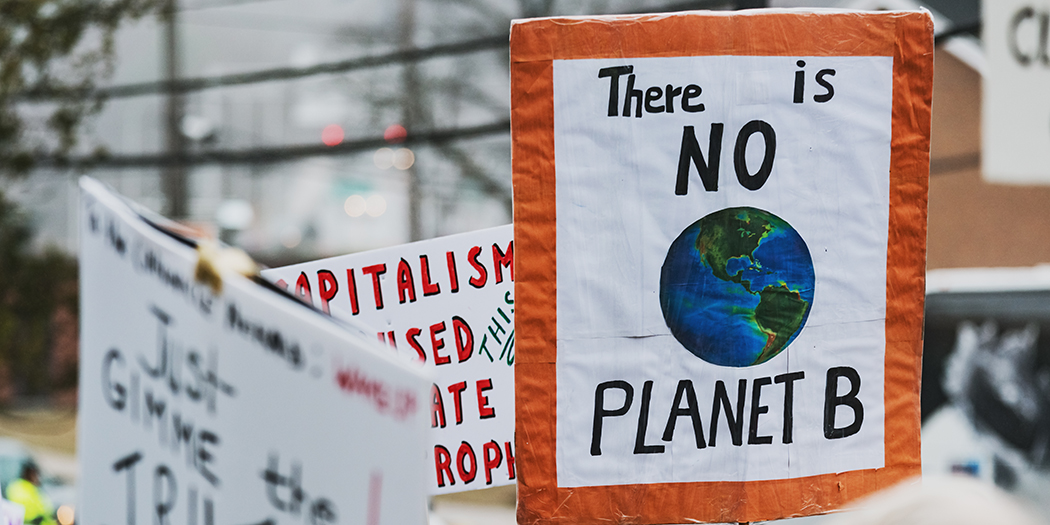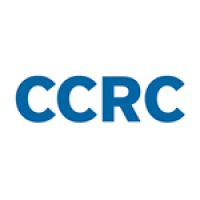By Maggie P. Fay and Susan Bickerstaff
In recent months, large numbers of Americans have experienced the impact of dramatic and devastating weather events linked to climate change. From unprecedented fires across the western United States to increasingly frequent and damaging hurricanes, with each passing year, the effects of the warming planet are becoming increasingly evident in our daily lives. In 2018, the Intergovernmental Panel on Climate Change (IPCC) issued a special report on global warming that urgently called for limiting warming to 1.5 degrees Celsius in order to avoid the most “long-lasting or irreversible changes” to the climate and ecosystems. While this goal is achievable, members of the IPCC cautioned that success would require rapid, unprecedented actions and far-reaching coordination.
Shortly before the onset of the coronavirus pandemic, followed by nationwide (and global) protests against the murder of Black citizens, CCRC was planning to announce our commitment to mitigate climate change by reducing research-related travel. The climate crisis has been pushed to the background by the other crises of recent months, and our plans to reduce travel have been obviated by the pandemic lockdown. Yet, as we look ahead to the eventual loosening of travel restrictions, we see ways for CCRC and our peer organizations to use the lessons of the pandemic to come to a new understanding of what travel is essential and how we will conduct the business of education research moving forward.
We at CCRC are concerned about climate change. We are worried about the future of the planet and the quality of life that awaits the young people in our lives. We are also concerned about how climate change threatens the work that we do. We study community colleges because they provide critical access to postsecondary education and are uniquely positioned to promote equity and social mobility in the United States. Going to college is fundamentally an investment in the future, which relies on the coherence of a future world to reward that investment. The prospect of an ever less habitable planet imperils the future and the values that spur us to pursue higher education. We are committed to helping higher education reach its promise to disrupt, rather than reproduce, patterns of racial and economic stratification in the United States. But climate change is inimical to equity, too. Members of low-income, socially marginalized communities will be the hardest hit by climate change, and they have the least resources to demand action.
The way that we have typically done business as a research organization has negative impacts on the environment. Collectively in 2019, CCRC staff took 365 flights to do the work that education researchers do, like attend conferences, convenings, and trainings, and to visit college campuses to collect data. Air travel has traditionally been critical to our work in order to build relationships with partners around the country; to understand the experiences of community college faculty, staff, and students firsthand; and to disseminate our findings. However, air travel is a large contributor to greenhouse gas emissions that result in global warming, and we, like others in the field of higher education, recognize that our practices must change.
Global pandemic lockdowns greatly reduced the consumption of fossil fuels for travel, but as economies reopen, carbon emissions are already surging back. Since early March, CCRC has completely suspended all travel; this disruption to our business practices presents an opportunity for us to reconsider what travel is truly necessary for the work that we do.
We generally travel for three purposes: qualitative data collection, research dissemination, and meetings with partners. For qualitative data collection, we have learned a lot in the last six months about what can be accomplished on the phone or using video conferencing. Moving forward, instead of assuming that staff will travel to visit colleges, we will create review procedures to determine when travel is warranted for data collection and when we can instead use remote technologies to get the job done.
Like professionals in many fields, higher education researchers have traditionally been expected to attend conferences and meetings to disseminate our work and build and maintain relationships with partners. There has been an assumption that these in-person events are the most effective way to communicate our findings and generate ideas for new projects, even when these practices were sometimes wasteful and inefficient. During the pandemic, our field has adapted to new norms for convening and communication. CCRCers look forward to reconvening with our colleagues and partners from across the nation, but this pandemic has taught us that high-quality virtual meetings and learning events are possible, and airplane travel can and should be used judiciously.
We want to share our commitment to curb greenhouse gas emissions in order to keep ourselves accountable. We also call on others in our field to use this experience to reevaluate what is truly indispensable to research in the light of a deepening climate crisis. Many question the value of individual actions to mitigate climate change, arguing that at this point only structural level, governmental interventions will address the magnitude of the issues. We disagree. Changes on the part of individuals and organizations can help us realize our own power to help save the environment; they can lead to behavior changes on a larger scale, and critically, they demonstrate the public’s demand that governments and corporations change policies to minimize consumption of fossil fuels and mitigate environmental degradation.
In order to bring about the unprecedented changes to how we consume fuel and the coordination necessary to avert the very worst effects of climate change, all sectors of the economy must participate. Climate change is a threat to the habitability of the planet; it also poses an existential threat to the future of higher education and to the values that led many of us into education research. We want to do our part.
Maggie P. Fay is a research associate at CCRC. Susan Bickerstaff is a senior research associate and program lead at CCRC.





